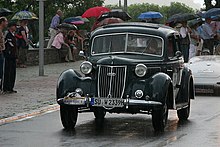Wanderer W 23
| walker | |
|---|---|
|
Wanderer W 23 Cabriolet (1938)
|
|
| W 23 / W 26 / W 52 | |
| Production period: | 1937-1941 |
| Class : | upper middle class |
| Body versions : | Touring car , limousine , Pullman limousine , station wagon , cabriolet |
| Engines: |
Otto engine : 2.65 liters (45.6 kW) |
| Length: | 4600-4800 mm |
| Width: | 1680-1700 mm |
| Height: | 1650-1750 mm |
| Wheelbase : | 2900-3150 mm |
| Empty weight : | 1790-1940 kg |
| Previous model | Wanderer W 45 / W 51 |
The Wanderer W 23 is a car of the upper middle class of the brand Wanderer with 2.65-liter six-cylinder - inline engine and rear-wheel drive . The Auto Union presented him in 1937 as a successor to the models W 45 / W 51 before. Around 7,900 W 23 Wanderers had been sold by 1940. At the end of 1941 / beginning of 1942 another 100 convertibles were built for the Reich Labor Service .
The W 23 built in the Auto Union plant in Siegmar near Chemnitz had a newly designed engine with a displacement of 2651 cm³ and an output of 62 hp at 3300 min −1 , which compared to its predecessors with OHV valve control was only side-controlled , but seven PS offered more power. The rear wheels were driven via a four-speed gearbox with a shift lever in the middle of the car. The chassis with the wheelbase shortened by 10 cm to 2.9 meters had a " floating axis " (rigid axle with raised transverse leaf spring) at the rear instead of the complex swing axle. In addition, the on-board electrical system voltage was reduced from 12 to 6 volts. These changes - which were actually setbacks - were necessary for price reasons. A four-door sedan , a two-door convertible and a station wagon with wooden struts on the outside of the body (called “Woody” in the USA) were offered. In Dresden , Glasses built the convertible bodies onto the W 23 chassis delivered from Siegmar .
At the same time, the Wanderer W 26 with the same engine and a longer wheelbase of 3.15 m was built as a touring car and a Pullman limousine , each with six seats. The rear "swing axle" ( pendulum axle ) of the W26 predecessor, the W 50, was retained because the high-lying spring package of the floating axle took up too much space.
As a sister model of the W 23, the Wanderer W 52 with the same engine, 10 cm more wheelbase (3 m) and a rear swing axle was also part of the Auto-Union program, so that customers who wanted modern chassis technology could also make an offer. However, there were only about 1,400 buyers, and so this model disappeared again at the end of 1937. The car was available as a four-door sedan (6 windows) and a two-door convertible (4 windows).
Due to the war, the production of Wanderer brand cars was discontinued in 1941 and was not resumed after the Second World War due to the liquidation of the "old" Auto Union .
Technical specifications
| Type | W 23 | W 26 | W 52 |
| Construction period | 1937-1941 | 1937-1940 | 1937 |
| Superstructures | L4, Cb2, K5 | T6, PL4 | L4, Cb2 |
| engine | 6 cyl. Row 4-stroke | 6 cyl. Row 4-stroke | 6 cyl. Row 4-stroke |
| Valves | standing (sv) | standing (sv) | standing (sv) |
| Bore × stroke | 75 mm × 100 mm | 75 mm × 100 mm | 75 mm × 100 mm |
| Displacement | 2651 cc | 2651 cc | 2651 cc |
| Horsepower) | 62 | 62 | 62 |
| Power kW) | 45.6 | 45.6 | 45.6 |
| consumption | 15 l / 100 km | 15.5 l / 100 km | 15 l / 100 km |
| Top speed | 115 km / h | 105 km / h | 115 km / h |
| Empty weight | 1390-1450 kg | 1470 kg | 1440-1500 kg |
| Perm. total weight | 1790-1850 kg | 1940 kg | 1840-1900 kg |
| Electrics | 6 volts | 6 volts | 6 volts |
| length | 4600 mm | 4800 mm | 4700 mm |
| width | 1700 mm | 1700 mm | 1680 mm |
| height | 1650 mm | 1750 mm | 1650 mm |
| wheelbase | 2900 mm | 3150 mm | 3000 mm |
| Front / rear track | 1420 mm / 1450 mm | 1350 mm / 1350 mm | 1350 mm / 1350 mm |
| Turning circle | 12 m | 14.3 m | 12 m |
- T6 = 6-seater touring car
- L4 = 4-door sedan
- PL4 = 4-door Pullman - Limousine
- K5 = 5-door station wagon
- Cb2 = 2-door convertible
literature
- Werner Oswald : Deutsche Autos 1920–1945 , Motorbuch Verlag, Stuttgart 1996, 10th edition, ISBN 3879435197
Web links
- www.audi.de - Evolution of the models: 1932–1945 Wanderer W 23 Cabriolet, 1939


